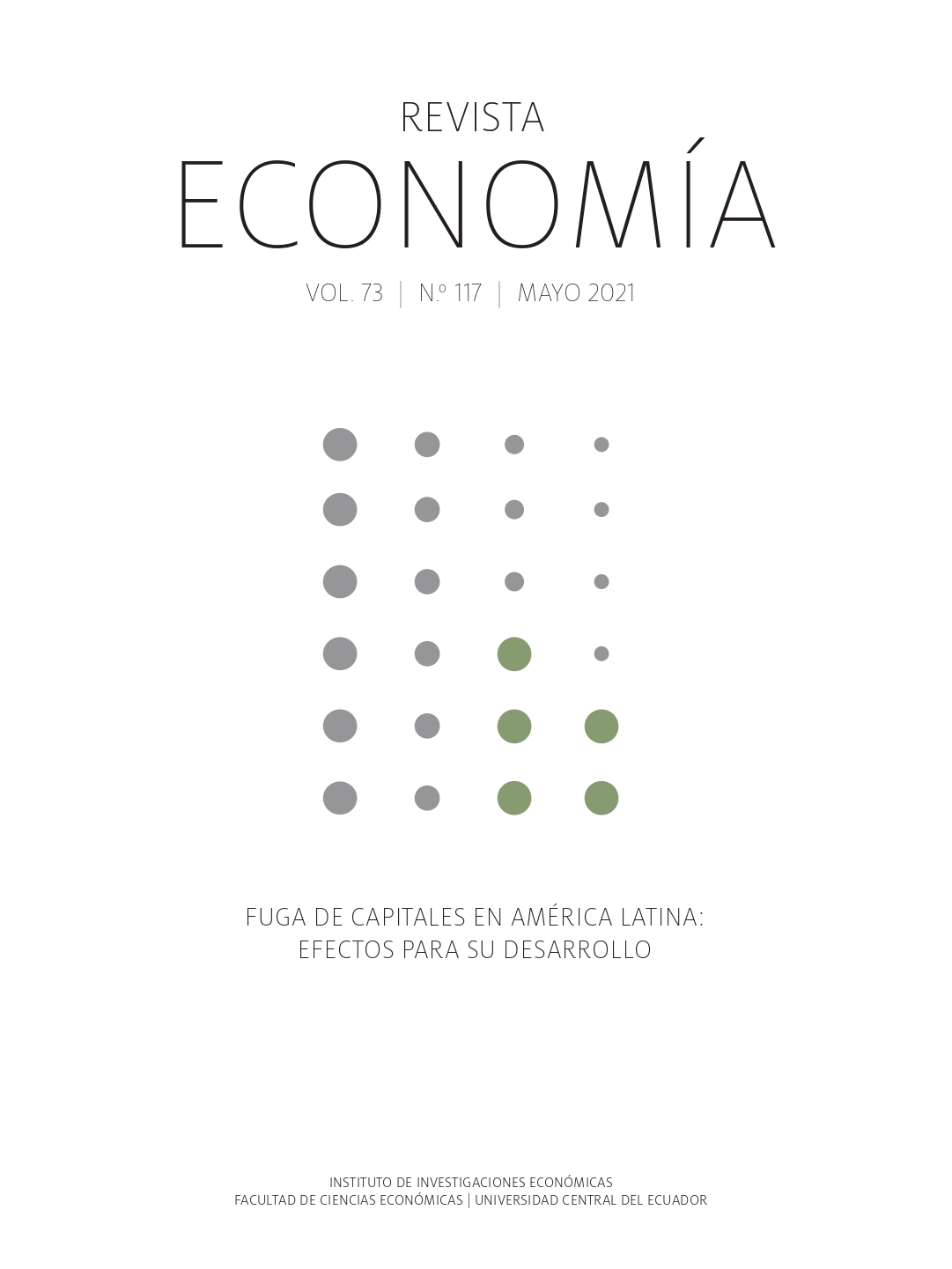Sentado en un carrusel: Fuga de capital en el Ecuador (2018-2020)
Main Article Content
Abstract
The article studies the process of capital flight form a monetary point of view. We identify systemic conditions for the possibility of continuous flight that derive from the nature of international payments. The data for Ecuador for the years 2018-2020 allow us to identify a "merry-go-round" of public indebtedness and acquisition of external private assets, a process that we interpret - tentatively - as an expression of the contradictions of the peripheral accumulation process and its mediation by the nation-state.
Downloads
Article Details

This work is licensed under a Creative Commons Attribution-NonCommercial 4.0 International License.
The authors who publish in this journal accept the following conditions:
- The authors retain the copyright and assign to the Economics Magazine the right of the first publication, with the work registered under Creative Commons Attribution-NonCommercial 4.0, which enables third parties to redistribute, commercial or non-commercial, of what has been published as long as the article circulates completely and without changes.
- Authors can make other independent and additional contractual agreements for the distribution of the article published in this journal (for example, add it to an institutional repository or publish it in a book) as long as they clearly and clearly specify that the article was published for the first time. once in Revista Economía. In case of reproduction, a note similar to the one presented below must be included: This text was originally published in the Revista Economía No.…, volume…, number of pages, year of publication.
- Authors are suggested to publish their work on the internet (for example, on institutional or personal pages) of the final version published by Revista Economía since this can lead to greater and faster dissemination of the published article.
References
Arestis, P., & Sawyer, M. C. (Eds.). (2006). A handbook of alternative monetary economics. Cheltenham, UK ; Northampton, MA: Edward Elgar.
Bailly, J.-L., Cencini, A., & Rossi, S. (Eds.). (2017). Quantum macroeconomics: the legacy of Bernard Schmitt. Abingdon, UK; New York, NY: Routledge.
Beretta, E. (2017). From reparations to (net) interest payments on external debt: same script, different cast. En J.-L.Bailly, A. Cencini & S. Rossi (Eds). Quantum macroeconomics: the legacy of Bernard Schmitt (pp. 105-121). Abingdon, UK; New York, NY: Routledge.
BCE a) (varias fechas). Boletín de Reservas Internacionales. Accessible en: https://contenido.bce.fin.ec/documentos/Estadisticas/SectorMonFin/RILD/Indice.htm
BCE b) (2020). Boletín Trimestral de la Balanza de pagos del Ecuador (No. 74). Accessible en: https://contenido.bce.fin.ec/documentos/Estadisticas/SectorExterno/BalanzaPagos/boletin74/indice.htm
BCE c) (2020). Financiamiento del Sector público no financiero. Accessible en: https://contenido.bce.fin.ec/documentos/Estadisticas/SectorFiscal/OperacionesSPNF/FinanSPNF.xlsx
Cartelier, J. (2010). Money is the scribe of a Market Economy. En M. Amato, L. Doria & L. Fantacci (Eds.), Money and calculation: Economic and sociological perspectives (pp. 16-33). Hampshire: Palgrave Macmillan.
Cencini, A. (2012). Macroeconomic Foundations of Macroeconomics. Hoboken: Taylor and Francis. Retrieved from http://grail.eblib.com.au/patron/FullRecord.aspx?p=214719
Cencini, A. (2017). National Banking Reform. En J.-L.Bailly, A. Cencini & S. Rossi. Quantum macroeconomics: the legacy of Bernard Schmitt (pp. 85-102). Abingdon, UK; New York, NY: Routledge.
Epstein, G. A. (2007). Capital flight and capital controls in developing countries. Cheltenham: Edward Elgar.
Fondo Monetario Internacional (s.f). IIP Summary Presentation Ecuador, IMF Data. Recuperado el 1. de Abril 2021 de https://data.imf.org/?sk=7A51304B-6426-40C0-83DD-CA473CA1FD52&sId=1542640325115
Gaggero, A., Gaggero, J., & Rúa, M. (2015). Principales características e impacto macroeconómico de la fuga de capitales en Argentina. Problemas del Desarrollo, 46(182), 67–90. https://doi.org/10.1016/j.rpd.2015.06.002
Hudson, M. (2009, primera edición 1992). Trade, development and foreign debt: how trade and development concentrate economic power in the hands of dominant nations. Sin lugar de publicación: ISLET.
Iñigo Carrera, J. (2013). El capital: razón histórica, sujeto revolucionario y conciencia. Buenos Aires: Imago Mundi.
Kornblihtt, J., & Dachevsky, F. (2017). Crisis y renta de la tierra petrolera en Venezuela: crítica a la teoría de la Guerra Económica. Cuadernos Del Cendes, 34(94), 002–030. Accesible en: http://ve.scielo.org/scielo.php?script=sci_abstract&pid=S1012-25082017000100002&lng=es&nrm=iso&tlng=es
Marx, K. (2000). El capital: crítica de la economía política: libro primero: el proceso de producción del capital: volumen I. Madrid: Siglo XXI de España Editores, S.A.
Mehrling, P. (2012). The Inherent Hierarchy of Money. Accesible en http://sites.bu.edu/perry/files/2019/04/Mehrling_P_FESeminar_Sp12-02.pdf
Mehrling, P. (2013). Essential hybridity: A money view of FX. Journal of Comparative Economics, 41(2), 355–363. https://doi.org/10.1016/j.jce.2013.03.007
Rochon, L.-P., & Rossi, S. (2003). Modern Theories of Money: The Nature and Role of Money in Capitalist Economies. Cheltenham, UK; Northampton, MA: Edward Elgar Publishing.
Rossi, S. (2006). The theory of money emission. En P. Arestis & M. C. Sawyer, (Eds.). A handbook of alternative monetary economics (pp. 112-138). Cheltenham, UK ; Northampton, MA: Edward Elgar Publishing.
Rossi, S. (2007). Money and payments in theory and practice. London; New York: Routledge.
Schmitt, B. (1984). Inflation, chomage et malformations du capital: macroeconomie quantique. Paris: Économica.
Schumpeter, J. A. Des Wesen des Geldes (La esencia del dinero). Publicado por Fritz Karl Mann. Göttingen: Vandenhoeck u. Ruprecht.
Smithin, J. N. (Ed.). (2000). What is money? London ; New York: Routledge.
Stützel, W. (1978). Volkswirtschaftliche Saldenmechanik: ein Beitrag zur Geldtheorie (2. Edición). Tübingen: J.C.B. Mohr (P. Siebeck).
Sutherland, M. (2016). Crítica a la política económica del “socialismo del siglo XXI” : apropiación privada de la renta petrolera, política de importaciones y fuga de capitales. Estudios Latinoamericanos, (38), 39. https://doi.org/10.22201/cela.24484946e.2016.38.57456

